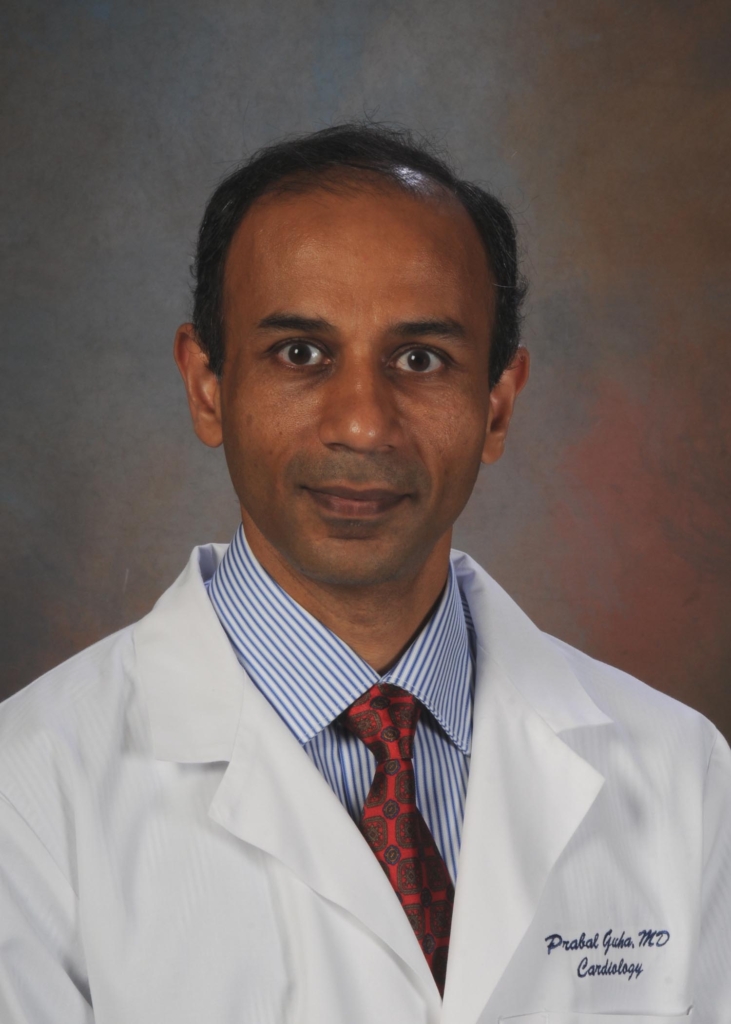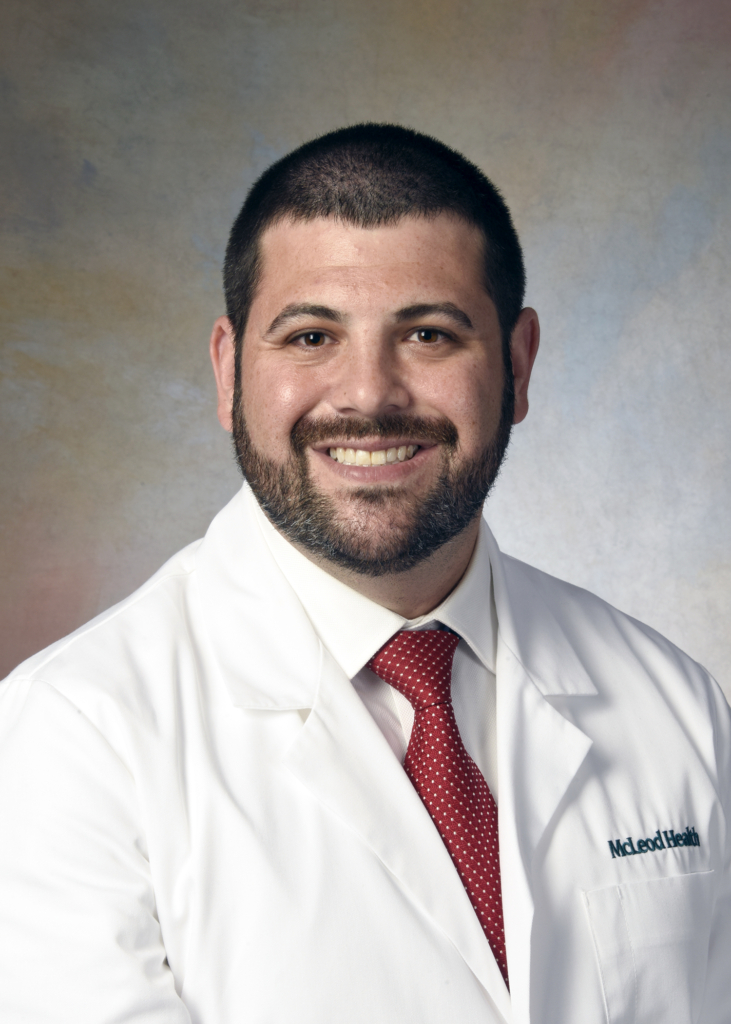New Electrophysiology Device Lab at McLeod Opens the Way for the Treatment of More Heart Patients
The McLeod Heart and Vascular Institute has opened a new dedicated Electrophysiology Device Lab at McLeod Regional Medical Center. With the opening of the new lab, McLeod Health now has four dedicated Electrophysiology Labs: one at McLeod Health Seacoast and three at the Florence campus. Pacemakers, Defibrillators, and Internal Loop Recorders are some of the services that are offered in this new space.
Dr. Prabal Guha and Dr. Cyrus Kocherla at McLeod Regional Medical Center, and Dr. Kishore Subnani at McLeod Health Seacoast are the McLeod Electrophysiologists who provide electrophysiology care. Electrophysiology is the treatment of the heart’s electrical system.
With this three-physician team, volume demands and case complexity have increased and an additional Electrophysiology Lab was warranted. The new lab had been designed to accommodate physician workspace from both sides of the operating table, ease of access for stretchers, upgraded imaging equipment, and a cohesive monitoring room.
Radiation exposure is always a concern in electrophysiology. Excellent image quality and the lowest possible radiation dose are both requirements for patients and staff. Additionally, the new system at McLeod is a truly integrated solution for enhanced patient care. It is equipped with standard applications for dose savings and image quality enhancements to help deliver better patient care at the lowest possible dose.
The two original Electrophysiology Labs at McLeod Regional Medical Center enabled the physicians to perform the more complex cases such as ablations with 3D mapping and the Watchman, an implantable device that reduces the risk of atrial fibrillation-related strokes. The McLeod Electrophysiology team was the first to bring this technology to McLeod. Interventional Cardiologists Dr. Brian Blaker and Dr. Ravi Parikh from the McLeod Structural Heart Team are now also credentialed and performing the Watchman procedure.
Structural Heart Program
The opening of the new Electrophysiology Lab has also paved the way for increased availability for cases performed by the McLeod Structural Heart Team. Many of these procedures need the advanced technological equipment available in a specialized lab.
The McLeod Structural Heart provider team includes: McLeod Interventional Cardiologists Dr. Brian Blaker and Dr. Ravi Parikh; McLeod Cardiothoracic Surgeons Dr. Cary Huber, Dr. Robert Messier, and Dr. Srinivas Kolla; McLeod Cardiac Anesthesiologists Dr. Dan Fox, Dr. Robert Savage, Dr. Robert Casella, and Dr. Yaroslav Yatsky; Valve Coordinator Ryan Hill, FNP; and Patient Navigator Traci Berry, RN. McLeod Vascular Surgeons Dr. Carmen Piccolo, Dr. William Jackson, and Dr. Eva Rzucidlo also assist, when necessary, to repair diseased blood vessels to enable the treatment of structural heart disease.
Structural heart disease can be present at birth or develop with age. It refers to abnormalities in the heart’s valves, walls, or chambers.
The McLeod Structural Heart Program specializes in minimally invasive and surgical treatment of patients with a variety of structural heart disease, including patients who do not qualify for conventional open-heart procedures. Examples of minimally invasive treatments include Transcatheter Aortic Valve Replacement (TAVR) for the treatment of aortic stenosis, MitraClip for the treatment of mitral regurgitation, and ASD/PFO closure.
TAVR
Transcatheter Aortic Valve Replacement (TAVR) is a procedure to replace a diseased heart valve. During this procedure, the physician inserts a long flexible thin tube, called a catheter, through a small incision in the groin. It is then advanced to the heart using X-ray imaging. The artificial valve is then passed through the catheter over a wire and precisely positioned across the diseased valve. The new valve is then released and starts functioning immediately. The old valve provides the foundation to hold the new valve in place. The majority of these less invasive procedures can be done in the cardiac catheterization lab without general anesthesia, and most patients can return home within one to two days.
MitraClip
MitraClip is a device used to treat mitral regurgitation, also known as a leaking heart valve. This procedure uses X-Ray imaging and ultrasound technology to deliver the MitraClip device to the correct position in the heart using a catheter advanced through a blood vessel in the leg. Once in place, the clip connects the two mitral valve leaflets reducing the amount of regurgitation or leaking. This helps to improve proper blood flow through the heart and can lead to improvement in heart failure symptoms and reduces the risk of being hospitalized from congestive heart failure.
Patent Foramen Ovale (PFO)
Everyone is born with a small flap, or hole, between the upper chambers of the heart to allow the baby to receive oxygen from the mom. It typically seals off within a few months. For about 75 percent of the population, the flap will seal. For the other 25 percent, the flap remains open and is commonly referred to as a “hole in the heart” or in medical terms a patent foramen ovale (PFO). While most people who have a PFO are asymptomatic, some individuals can be at an increased risk for stroke, and there is also an association with chronic migraine headaches that do not respond to conventional medication and treatments.
The technology available at McLeod to seal off the hole is the PFO Closure Procedure. It is another minimally invasive procedure achieved by passing a small device through a vein in the leg. Performed in the cardiac catheterization lab under conscious sedation and using a local anesthetic, most patients can go home the next day.
Using X-Ray and Ultrasound, the PFO Closure Device is advanced to the location of the hole that separates the upper chambers of the heart. Once in the proper position, the device is carefully released to form one circular disk covering the hole on the left side, and a second disk on the right side. The disks are anchored together keeping them securely in place and effectively sealing off the hole to prevent the abnormal flow of blood between the two chambers and reducing the likelihood of small clots, passing from one side to another.
Dr. Prabal Guha is a Board Certified Electrophysiologist with McLeod Cardiology Associates. Dr. Guha cares for patients at McLeod Cardiology Associates offices located in Florence and Sumter.
Dr. Brian Blaker is Board Certified Interventional and Structural Cardiologist with McLeod Cardiology Associates. Dr. Blaker serves as the Medical Director of the McLeod Structural Heart Program and cares for patients at McLeod Cardiology Associates in Florence.
Physician and self-referrals for Dr. Guha and Dr. Blaker are welcome by calling 843-667-1891.
-
McLEOD REGIONAL MEDICAL CENTER FLORENCE
843-777-2000 -
McLEOD DARLINGTON
843-777-1100 -
McLEOD DILLON
843-774-4111 -
McLEOD LORIS
843-716-7000 -
McLEOD SEACOAST
843-390-8100 -
McLEOD CHERAW
843-537-7881 -
McLEOD CLARENDON
803-433-3000



-
McLEOD REGIONAL MEDICAL CENTER FLORENCE
843-777-2000 -
McLEOD DARLINGTON
843-777-1100 -
McLEOD DILLON
843-774-4111 -
McLEOD LORIS
843-716-7000 -
McLEOD SEACOAST
843-390-8100 -
McLEOD CHERAW
843-537-7881 -
McLEOD CLARENDON
803-433-3000
 Find a Doctor
Find a Doctor  Locations
Locations  Services
Services 
